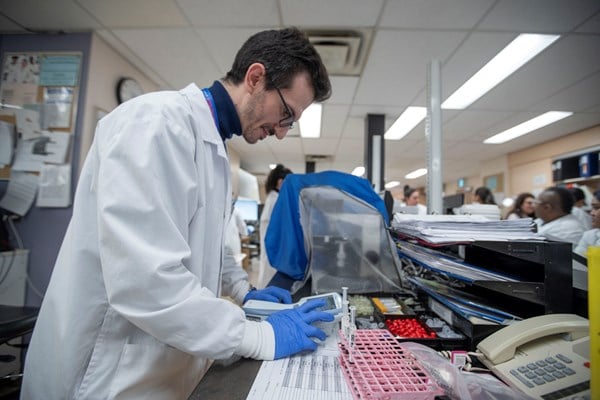Lab & Testing Services
- Phone:
- 416-813-7200
- Hours:
- Customer service representatives are available Monday to Friday, 7 a.m. to 5 p.m. EST.
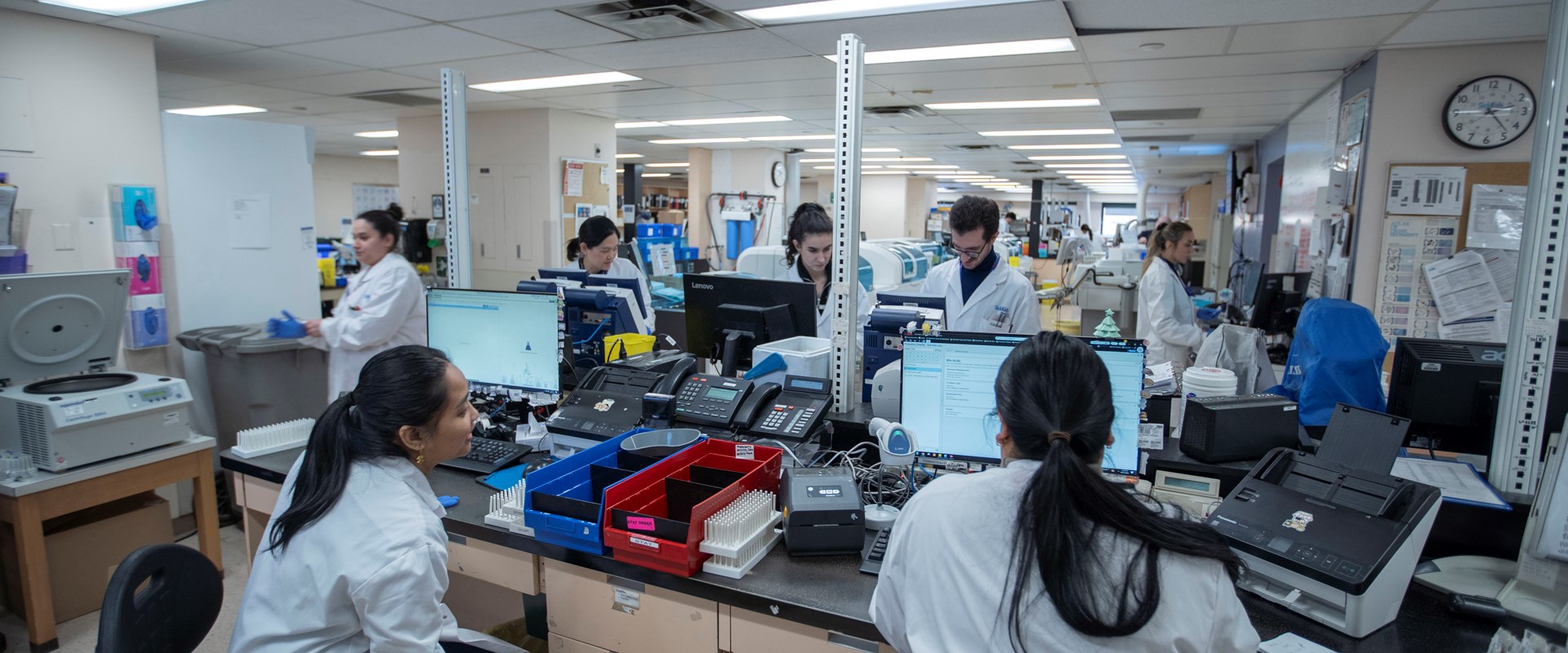
Welcome to the Department of Paediatric Laboratory Medicine
The Department of Paediatric Laboratory Medicine (DPLM) at SickKids is a leading, world-class facility working towards reducing the impact of childhood illness by quickly providing diagnoses that lead to early selection of best treatment options. DPLM is a valuable and integral part of the SickKids team, generating original research and providing timely, specialized diagnostic services for health-care providers in Canada and around the world.
Download requisition forms.
Browse our test catalogue.
View our lab contacts, operating hours, and shipping and drop-off information.
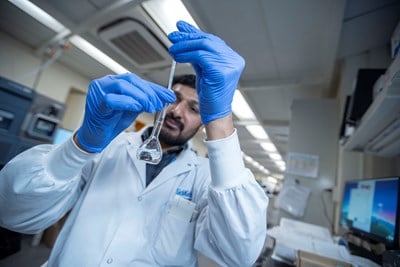
Explore our labs and services in Routine Biochemistry, Therapeutic Drug Monitoring, Metabolic Diseases and more.
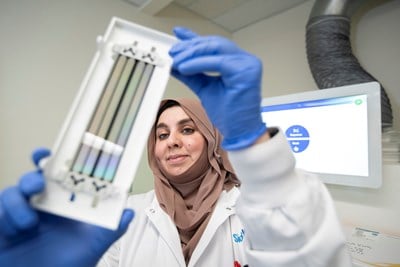
Explore our labs and services in Cytogenetics, Molecular Genetics, Microarray and Clinical Fibroblast.
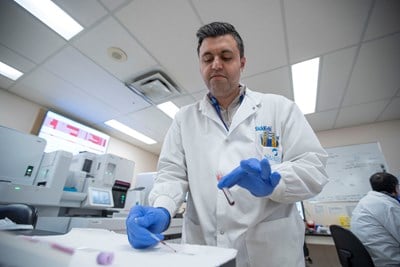
Explore our labs and services including Haematology, Coagulation, Flow Cytometry, Molecular Haematopathology, Blood Transfusion and Tissue Bank.
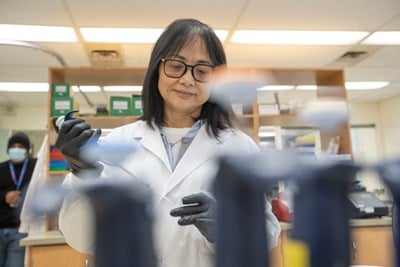
Explore our labs and services specializing in Electron Microscopy, Histology, Immunopathology, Molecular Pathology, Morphometry and Neuropathology.
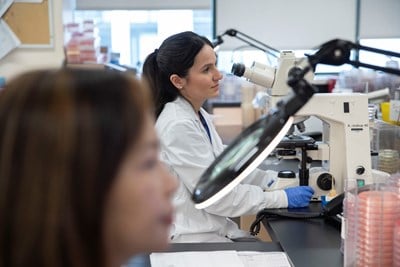
Explore our diagnostic services offered by the Microbiology Laboratory, covering Bacteriology, Virology, Serology, Mycology and Molecular Microbiology.
Licensing & accreditation
DPLM has successfully participated in and has received many accreditation certifications provincially, nationally and internationally. Expand the sections below to view current certificates and licenses.
MOH Lab Licence 2024-2026 (pdf)
Expiry: October 29, 2026
Accreditation Canada ISO 15189 Plus 2023–2027 (pdf)
Expiry: March 19, 2027
Health Canada - CTO Tissue (pdf)
Expiry: December 31, 2027
College of American Pathologists (CAP) (PDF)
Expiry: June 2026
Centre for Medicare & Medicaid Services: Clinical Laboratory Improvement Amendments (PDF)
Expiry: August 17, 2026
- American College of Medical Genetics (ACMG)
- Canadian Immunohistochemistry Quality Control for Pathology (CIQC)
- CDC Newborn Screening Program
- Charles River Proficiency Test Program
- College of American Pathologists (CAP)
- Continuous Improvement and Qualifying for Accreditation Project (CIQAP)
- Euroimmune - Serology
- European Research Network for evaluation and improvement of screening, Diagnosis and treatment of Inherited Disorders of Metabolism (ERNDIM)
- Exchange with Mount Sinai
- FHCRC - Otsuka Pharmaceuticals and Seattle Cancer Care Center (Peer group assessment program)
- Immprove Quality Assurance Scheme - Immunology
- Institute for Quality Management in Healthcare (IQMH)
- Institute for Research Information and Quality Assurance
- International External Foundation Quality Assessment Programme (ECAT)
- International Proficiency Testing Schemes (IPTS)
- International Tay-Sachs Testing (NTSAD)
- Internal Split Sample Procedure (I.S.S)
- KKGT - Stichting Kwaliteitsbewaking Klinische Geneesmiddelanalyse en Toxicologie (Association for Quality Assessment in Therapeutic Drug Monitoring and Clinical Toxicology) - Netherlands
- Labquality EQA Program
- LGC Standards
- National Lab for HIV Immunology
- National Lab for HIV Reference and Service (NLHRS)
- National Microbiology Laboratory – Molecular Microbiology
- North American Specialized Coagulation Laboratory Association (NASCOLA)
- Pharmacokinetic
- Post analytical DNA Sequencing Challenge SEC
- Qnostic – Molecular Microbiology
- Quality Control for Molecular Diagnostics (QCMD)
- Siemens Urinalysis Proficiency Study
- Stichting Kwaliteitsbewaking Medische Laboratoriumdiagnostiek (Dutch: Foundation for Quality Medical Laboratory Diagnostics) - (SKML)
- United Kingdom National External Quality Assessment Service (UKNEQAS)
- Vitamin D External Quality Assessment Scheme (DEQAS)
Statement of responsibility
Outlined below are the standard terms and conditions which apply to the referral of all specimens for laboratory testing to SickKids unless otherwise stipulated in a separate agreement.
Responsibility of SickKids
As a referral laboratory, under Accreditation Canada Diagnostics requirements, SickKids is responsible for:
- Reporting test results including critical/significant results to the referring health care institution. (Genetics results will be reported directly to the ordering physician).
- Providing documented or verbal interpretation of results.
- Complying with all applicable legal requirements to protect the privacy of all patient information.
- Notifying the referring health care institution immediately if we suspect non-proficient performance which may affect test results.
- Commitment to care that is centred on the needs of patients and their families. Learn more about Our Care Philosophy.
- Commitment to the principles of equity, diversity and inclusion. Learn more about SickKids EDI Strategy.

Each division within DPLM houses a number of basic and clinically-oriented research projects (supported by numerous grants from national and provincial granting foundations).

The pursuit of excellence in educational endeavours is one of the key missions of DPLM. Learn more about education and training opportunities available through our department.




